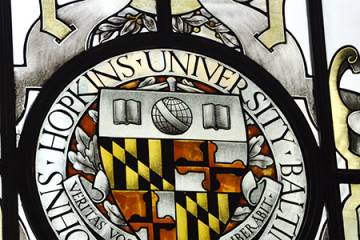The U.S. Supreme Court ruled Thursday against the Trump administration's attempt to dismantle a program that protects undocumented immigrants brought to the U.S. as children, a program Johns Hopkins University leadership has vigorously defended since talk of rescinding it began in late 2016. The court ruled 5-4, with Chief Justice John Roberts writing the majority opinion.
The Deferred Action for Childhood Arrivals program, or DACA, allows certain undocumented immigrants—so-called Dreamers, who entered the U.S. before turning 16 and before January 2007—to receive a renewable two-year work permit and remain in the country without fear of deportation. Since it was enacted in 2012, nearly 800,000 people have received protections under the program, which has helped many to enroll in American colleges and universities.
"We are grateful for the Supreme Court's decision in support of DACA students and the immediate relief it provides, even as we recognize the need for a permanent solution that must come from Congress," JHU President Ronald J. Daniels said Thursday. "These talented and devoted students were raised in America and should be able to pursue the promise of opportunity afforded by an education at a great American research university like ours without fear or anxiety. We will continue to join our peers in advocating vigorously on behalf of Dreamers and ensuring that they—and all members of our community—can participate fully, safely, and equally in our educational, research, and service mission."
In November 2016, Daniels joined more than 500 college and university presidents from public and private institutions across the U.S. in signing a statement in support of DACA and undocumented immigrant students. A December 2016 message to the Hopkins community from Daniels and Provost Sunil Kumar articulated the university's conviction that eroding protections for undocumented students would "affect our country's vitality in significant ways."
"Johns Hopkins strongly supports the DACA program and all efforts to allow students who have grown up in this country to enroll in college and make important contributions to our nation's promise and prosperity," Kumar said Thursday. "We all stand to benefit when we remove the barriers to higher education encountered by thousands of young scholars with diverse backgrounds and experiences."
The Trump administration had argued that the DACA program, authorized by President Barack Obama via executive order, was unlawful, announcing in September 2017 that the Department of Homeland Security would stop processing new applications. In his majority opinion, Roberts called DHS's action "arbitrary and capricious," and thus unlawful.
In a statement, the American Association of Universities, or AAU—an advocacy organization of 65 leading research universities, of which Johns Hopkins is a charter member—lauded the high court's decision and urged legislative action to protect DACA recipients.
While we are heartened by the Supreme Court's ruling in Department of Homeland Security et al. v. Regents of the University of California et al., DACA recipients' fate cannot remain up to executive action. The fact that this decision was based on procedural mistakes by the Trump administration rather than Equal Protection Clause violations only underscores the importance of Congress immediately and unequivocally addressing the unjust plight of DACA recipients and other "Dreamers" with a permanent legislative solution.
While AAU supported the arguments in defense of DACA and filed an amicus brief in the case, we have always asserted that Congress should resolve this matter by passing legislation to normalize the status of these deserving young people. The DACA program was never meant to be permanent, and DACA students at our universities—who are American in every way—deserve a solution that takes their fate out of the hands of shifting Executive Branch priorities and gives them and their communities certainty.
We congratulate the University of California and Princeton University, whose lawsuit on behalf of DACA recipients was consolidated with the California suit, on this important win for our students.
Posted in University News
Tagged immigration









